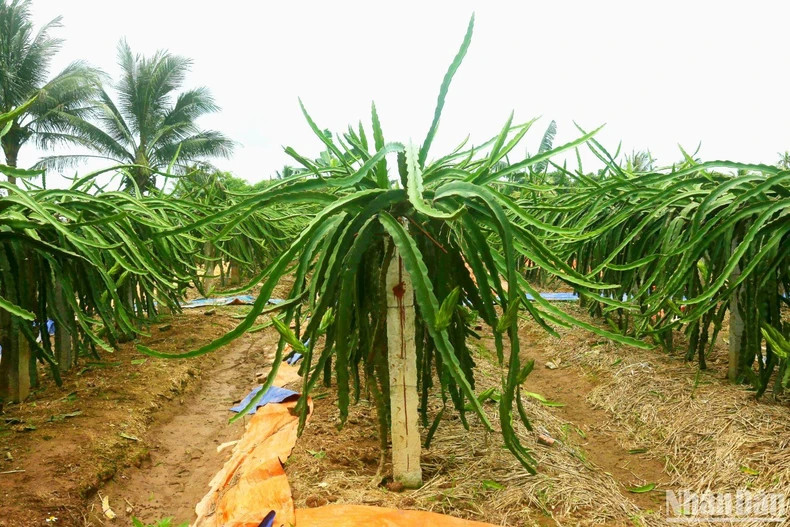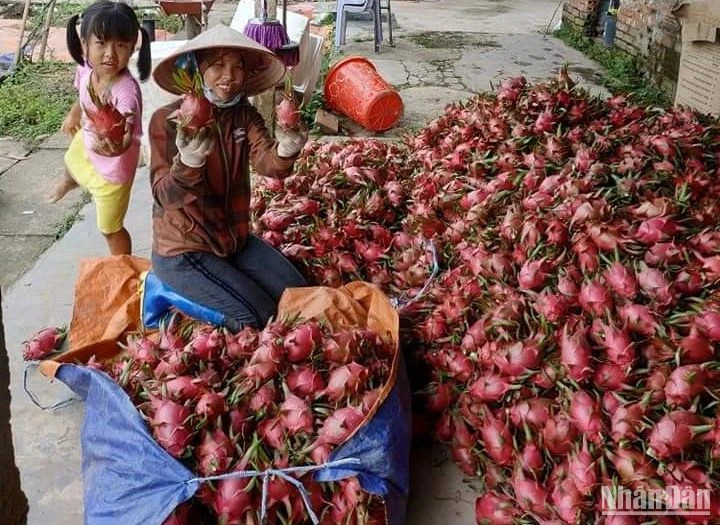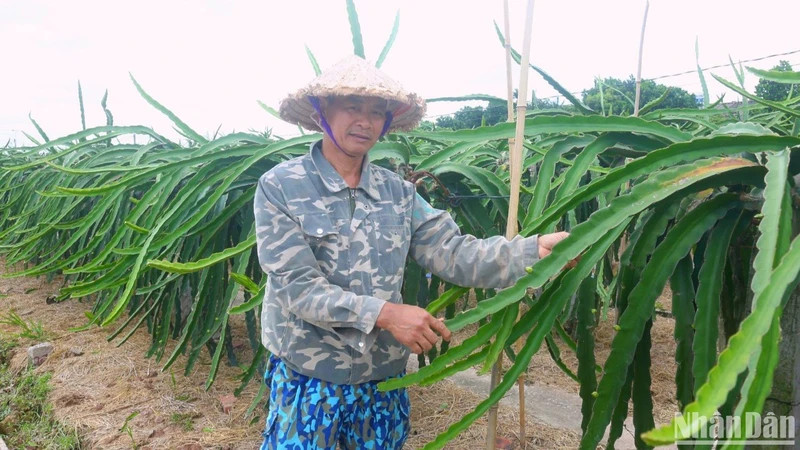Effective thanks to organic farming
As a person who was instrumental in mobilising people to change to crop cultivation, Mr Hoang Van Vien, Deputy Secretary of the Party Committee, and head of Truc Trang Village, said that in the past, people in Bat Trang Commune mainly grew rice and cultivated litchi trees. In 2015, dragon fruit cultivation began to rekindle locally. By 2018, a few households boldly invested and converted to farming dragon fruit to improve economic efficiency. By 2019, the total dragon fruit growing area of Truc Trang Village reached 20 hectares.
Currently, Truc Trang Organic Agricultural Cooperative has 20 members from the village. The village's total dragon fruit growing area is 40 hectares, with the participation of 300 households. The average output per hectare is 12-15 tonnes/year. The cooperative's average output reaches nearly 1,300 tonnes/year. The selling price ranges from 25-30 thousand VND/kg. On average, farmers can earn a profit of 15 million VND per year, 3-5 times more effective than growing rice. Thanks to dragon fruit trees, people have a stable income and many households have escaped poverty, by growing dragon fruit.
 |
| The total dragon fruit growing area of Truc Trang Organic Agricultural Cooperative is 40 hectares, with the participation of 300 households. (Photo: Ngoc Tan) |
Vien said that dragon fruit is an easy-to-grow, easy-to-cultivate plant suitable for soil and climate in many places, including Hai Phong, so it is chosen for local development. The tree bears fruit from April to October of the lunar calendar. Low investment costs give high profits, average capital is 5 million VND/acre, good growth ability, little care, 1 crop yields 7-11 generations.
Bat Trang Commune is favoured by nature as it has three sides bordering the river, and is located upstream of Lach Tray and Da Do rivers, so the water source is abundant, the land is fertile and suitable for forming the main production area of fruit trees. The organic dragon fruit growing area here is being paid attention to by the city, with plans to be developed into a specialised farming area, allowing people to switch from growing rice to other crops, including dragon fruit.
Dragon fruits of Truc Trang Cooperative are consumed mainly in the Hai Phong area, purchased by traders from the farm, and also appear in many supermarket chains, clean food stores, and large fairs. Consumers highly appreciate Truc Trang dragon fruit products for their delicious quality, rich sweetness, thin skin, eye-catching colour and rich nutrition. In addition to household use, it can also be used as a gift. With its superiority in quality, the cooperative's dragon fruit has been certified to meet VietGAP standards, with a label aiming to be a city-level OCOP product.
Cultivation and conversion from growing rice to dragon fruit bring higher economic efficiency than other local crops. My family currently has more than 1 acre of white-fleshed dragon fruit, with an annual output of over 1 tonne, earning a profit of 250-300 million VND/acre. Although they only started farming about 10 years ago, dragon fruit trees have helped many people in Truc Trang improve their lives, escape poverty, and get rich legitimately.
Vu Van Thuy, a member of Truc Trang organic agricultural cooperative
For the brand and quality of dragon fruit to be as it is today, it is impossible not to mention the process of converting farming methods from traditional to organic. As Deputy Director of the Cooperative, Mr Vien emphasised the role of organic farming: “Growing using organic methods helps dragon fruit trees grow and develop better, the fruit quality is sweet, and at the same time ensures safety for consumers, protecting the environment and natural ecosystem. In addition, organic growing helps reduce the use of pesticides on plants, helps plants increase resistance, reduces pests and moulds by up to 80%, and fruit weight increases from 350 grams to 500 grams”.
At first, people were not familiar with this method and were still timid and afraid. Mr Vien and the local administration have actively participated in mobilising people to convert and replace traditional production practices to the current organic direction to improve efficiency. Thanks to that, currently, all 40 hectares of dragon fruit of the cooperative have met 100% organic standards, and are planned into specialised growing areas under the direction of the city.
Overcoming difficulties and developing brand
Although effective, Bat Trang dragon fruit is facing difficulties in processing and preserving the product, directly affecting product consumption for farmers.
 |
| Bat Trang dragon fruit is facing difficulties in processing and preserving the product. (Photo: Ngoc Tan) |
“Dragon fruit has the disadvantage of ripening at the same time. The harvesting process needs to be urgent and timely, otherwise the quality of the fruit will be affected. Therefore, with gardens that ripen early or at the wrong time, the purchasing company must find ways to sell the products themselves. The cooperative is coordinating with the locality to build a preliminary processing warehouse to store and preserve agricultural products for cooperative members,” Vien said.
In addition, the problem of capital is also a common difficulty for cooperative members, needing support from the administration to create conditions to help people expand the scale and infrastructure to produce this specific type of tree.
Truc Trang Organic Agricultural Cooperative is also disseminating to members the method of using lanterns to make off-season dragon fruit. Lighting helps warm plants while increasing daylight hours to prolong photosynthesis, helping plants grow and flower better. This method is often used in the last months of the season, from October onwards. Off-season dragon fruit prices are twice as high as normal, and near Tet, the price can be up to 50,000 VND/kg. The cooperative hopes that the locality will continue to create favourable conditions for electricity sources to boost off-season productivity, contributing to increased profits.
Unlike inorganic farming, organic farming requires growers to have knowledge of methods and know how to regulate water and fertiliser through each stage, to achieve the highest efficiency. Biological products such as pruned old dragon fruit stems, along with other types of livestock waste, are utilised to help increase nutrients for the soil. In addition, people mainly use micro-organic fertilisers and mineral fertilisers provided by the city. The Agricultural Extension Centre of An Lao District and Hai Phong City regularly opens training and refresher classes, guiding people to acquire a lot of knowledge about organic farming before and after each crop, continuing to mobilise people to apply and promote science and technology in farming, forming specialised farming areas in the direction of commodity production.
With the achievements achieved, Truc Trang Organic Agriculture Cooperative is gradually asserting its position and brand for Bat Trang dragon fruit, directly competing with other growing areas in the market.
“In the coming time, the cooperative advocates stabilising and expanding growing areas, orienting development, applying high-tech techniques to production, increasing members to improve operational efficiency, making dragon fruit a typical fruit of the locality and widely known to many people," Vien said.
The dragon fruit of Truc Trang Organic Agriculture Cooperative has been recognised to meet VietGAP standards in 2021. The administration and people of Bat Trang Commune are striving to make dragon fruit an OCOP product next year, aiming to be a local staple crop.
















